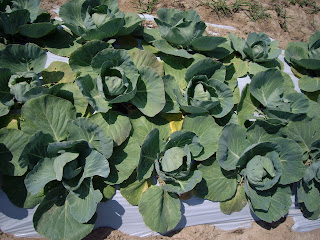
(Here is a picture of a few of our cherry tomatoes. The orange variety really is great for everything; they add bright colors to any dish and are sweet enough for snacking. Over in the next row are all the heirloom tomatoes. Our favorite are the Nyagous).
Our fields are near a popular road. The road is not popular in a national highway sense, but in a scenic byway sense. Hot rods and Harleys frequently tool along. Packs of cyclists rack up some beautiful miles. The road follows a river bed so it is twisty, flat and shaded. However, along the fields, there is nothing to block the sun. As it turns out, there is nothing to absorb the sound of conversations, either.
While working the land I often overhear private conversations. I frequently hear comments about the garden. Although it is accidental, I really appreciate the feedback. Comments like "Wow, look at all that corn, he must be feeding chickens" and "Wow, now that is a garden" offer me a new perspective or validate my current perspective. That is the power of feedback. It gives us the opportunity to tailor our farm's output to match the needs and wants of our customers.
In that spirit, we wish we would get more feedback from our customers. We have developed loyal customers who are very candid about their opinions of our produce. But there are other customers whose opinions we never hear. We often wonder if those heirloom tomatoes added just the right mixture of sweet and tangy to the salad. Or if that watermelon was the hit of the picnic. Feedback would let us know if and how to improve our offerings and field operations.
The super markets want you to be happy with their produce. But farmer's markets are willing to work to make you happy with our produce.

